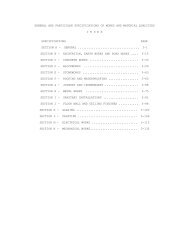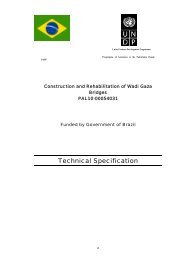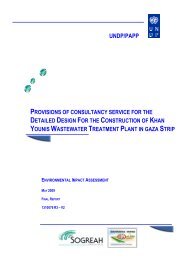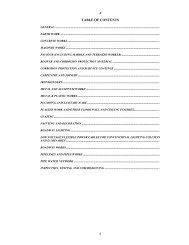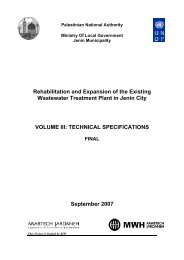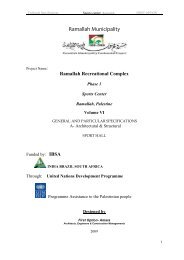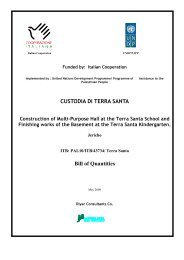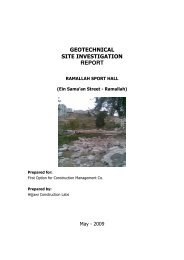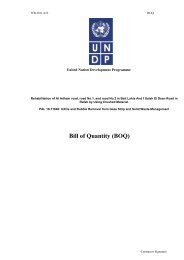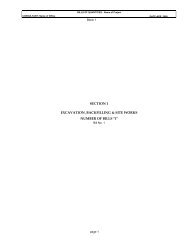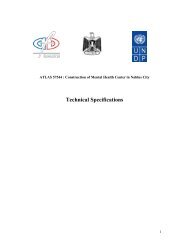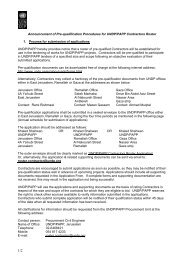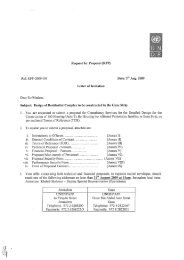Bedoin Projects Fact Sheet - UNDP
Bedoin Projects Fact Sheet - UNDP
Bedoin Projects Fact Sheet - UNDP
Create successful ePaper yourself
Turn your PDF publications into a flip-book with our unique Google optimized e-Paper software.
Programme of Assistance<br />
to the Palestinian People<br />
Bedouin Communities Development<br />
Programme<br />
They live on the hillsides and the valleys of the West<br />
Bank, maintaining a lifestyle that has been the mainstay<br />
of their communities for generations. Bedouins are an<br />
intrinsic and distinct part of the social fabrics of the<br />
region.<br />
Although a majority of Bedouins are originally from the<br />
Negev, they now dwell in a strip known as the “Bedouin<br />
Belt,” which includes south Hebron and the eastern<br />
slopes (east of Hebron, Bethlehem, Jerusalem and<br />
Ramallah) and they traditionally spend the winter in the<br />
Jericho or Ghor areas. All these areas are arid to varying<br />
degrees; hence, land use is limited to animal herding.<br />
The erratic rainfall and high evaporation in these areas<br />
leads to insecurity in the conditions of pastures and a<br />
constant threat of draught.<br />
MATTERS OF FACT<br />
• There are 6 main Bedouin tribes in the West Bank: Sariaa,<br />
Jahaleen, Kaabneh, Al Rashaydeh, Al Azazmi, and Al<br />
Ramadeen<br />
• It is estimated that there are between 25,000-30,000<br />
Bedouins, with 150,000-200,000 sheep and goats.<br />
• Nomadic Bedouins who maintain a semi-permanent<br />
residence comprise 5.2% of the families (4.9% of the<br />
population), with 3-5 months grazing and travel period.<br />
Sheep and goat production is the only source of income for<br />
20% of families within this group and for the remainder it is<br />
either the major source (20%) or a secondary source (60%).<br />
• Goat and sheep’s milk is marketed as a processed milk<br />
product. 45.4% of the milk production is sold as Jameed<br />
(dried yogurt), 25.8% as butter, 10.4% as ghee, 1.7% as<br />
labneh and 0.5% as cheese.<br />
• Only one third of the Bedouin communities (approximately<br />
55% of all families) are connected to a permanent electrical<br />
source. The remainder rely on small and expensive<br />
generators.<br />
• Per-capita water consumption is 15 litres per-day. This is<br />
compared to 35 litres per-day in other rural villages and 65-<br />
70 litres in urban areas.<br />
and lower productivity due to hygiene problems, in<br />
addition to lower market prices for their produce. This has<br />
lead to substantial reductions in family incomes.<br />
Poverty is in the rise in the oPt, with women and children in rural<br />
communities often bearing the brunt<br />
Given their nomadic lifestyle, the Bedouin community<br />
rely on their ability to move to better postures. They live<br />
in small and scattered communities in cement houses,<br />
cottages or tarpaulin tents. The traditional Bedouin tents<br />
are rarely used now, as they are expensive and not<br />
widely available. Bedouins in the “Bedouin Belt” earn<br />
their living by rearing animals and selling the related<br />
produce.<br />
Economic situation<br />
Bedouins face many constraints, including limited<br />
movement, diminished holding capacity and<br />
productivity, high production costs (particularly barley)<br />
The need for an alternative credit source<br />
For a variety of reasons, Bedouins are unable to secure<br />
loans in the modern money lending systems. They do not<br />
believe in depositing and saving their money in banks and<br />
prefer to invest in their animal herds, which are not<br />
classified as assets by commercial banks and thus, cannot<br />
be counted against loans. Moreover, if Bedouins were able<br />
to obtain loans, they would generally not take advantage<br />
of the service for religious reasons. Incurring interest on<br />
money borrowed is perceived as reba, which is prohibited<br />
in Islam.<br />
Water and Electricity<br />
Mainly due to political controversy over water rights and<br />
the use of water by Israel as a tool for repression, Bedouins<br />
have scant access to water resources and very few have<br />
access to electricity.<br />
Health<br />
Bedouin communities generally suffer from appalling<br />
hygiene conditions, which have resulted in severe health<br />
problems.
<strong>UNDP</strong>/PAPP’s Intervention<br />
Emergency Support to Bedouins in Eastern Slopes<br />
Project – November 2006<br />
The Ghore area, Western Jordan Valley including Jericho,<br />
hosts at least 5,000 Bedouins who live nomadic and<br />
semi-nomadic lifestyles and depend on around 55,000<br />
heads of sheep and goats, much above the national<br />
average and even higher than the Bedouin average<br />
ownership of small ruminants.<br />
The emergency support to the Bedouins in the Eastern<br />
Slopes project, worth US$250,000, was designed to<br />
provide emergency relief to the Bedouins living in the<br />
Jericho Ghore areas with the following objectives:<br />
• Improve access to water and storage capacity<br />
through the provision of water tanks and the<br />
extension of one water reservoir.<br />
• Provide a source of electricity<br />
• Facilitate school attendance by the provision of<br />
a minibus to transport school children.<br />
The project will benefit at least 5,000 people living in the<br />
region’s Bedouin community. The provision of water<br />
tanks will ease access and availability of water for<br />
household and animal use. In addition, both water and<br />
electricity will have a significant impact on the quality of<br />
Bedouin related products such as white cheese and will<br />
enable them to get a better price in exchange of<br />
improved quality.<br />
Development Programme for the Bedouin<br />
Communities in the West Bank – December 2004<br />
In addition to increasing general awareness, the<br />
project comprises two main components:<br />
1. Strengthen the Bedouins’ bargaining power by<br />
establishing the Palestinian Bedouin Corporation<br />
for Investment and Development (PBC)<br />
Privately owned and managed by Bedouin<br />
communities, the PBC represents a development<br />
model that could be adopted not only in the oPt, but<br />
also in neighbouring countries where development<br />
efforts fall short due to unsustainable subsidy<br />
approaches.<br />
2. Improve animal health, productivity and<br />
husbandry through a series of activities<br />
Two mobile veterinary clinics have been purchased,<br />
equipped with a veterinary doctor, laboratory and<br />
medication. The mobile clinics are equipped to<br />
provide services including ultrasounds, artificial<br />
insemination and vaccinations.<br />
Some 20-30 pilot farms will be established in the<br />
scattered Bedouin communities to demonstrate the<br />
positive implications of renovating and upgrading<br />
farm infrastructure.<br />
Another selected group of<br />
demonstration farms will<br />
show the advantages of<br />
improved herd management<br />
practices and animal hygiene.<br />
The introduction of improved<br />
animal breeds (Awassi sheep<br />
and Shami goats) in a third<br />
group of farms will also impact<br />
on the productivity of the<br />
farms. Improved farming<br />
techniques will have a positive<br />
effect on productivity and<br />
economic returns.<br />
Finally, a socio-economic and agricultural database<br />
with spatial dimension will be created to better identify<br />
Bedouin needs, monitor the project outcomes, build<br />
capacity and support future development initiatives.<br />
The principle objective of the project was to improve the<br />
livelihood of Bedouins through economic and technical<br />
assistance by formulating a concrete and sound<br />
sustainable development programme. The project,<br />
worth US$1.5 million, was designed in a partnership<br />
between the <strong>UNDP</strong>, the Palestinian Ministry of<br />
Agriculture and with generous funding from the<br />
Government of Italy, through the Italian Cooperation.<br />
Programme of assistance to the Palestinian people<br />
4A Ya'qubi St. P.O.Box 51359, Jerusalem<br />
Tel: (972 2) 6268200<br />
Fax:(972 2) 6268222<br />
www.undp.ps



